Peace and Nonviolence
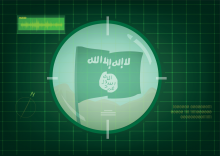
Here at Sojourners we have written a lot about nonviolence. We take seriously the words of Jesus that we should love our enemies and pray for those who persecute us. We believe that violence begets violence, or as Jesus put it, “Those who live by the sword die by the sword.” Personally, I take seriously the words of René Girard, the founder of mimetic theory, that we are now “confronted with a perfectly straightforward and even scientifically calculable choice between total destruction and the total renunciation of violence.”
Many Christians look to the Bible to justify divinely sanctioned violence against our enemies. Excuse me for stating the obvious, but Christians are not Biblians. We are Christians. As Christians, we should be putting Jesus first. Not Deuteronomy. Not Joshua. Not Judges. Not David. Not Solomon. Not Peter. Not Paul. Not the Bible.
Jesus first.
And Jesus calls us to nonviolence. As one of the early Christians stated, the way of Jesus, the way of nonviolent love that embraces our enemies, is the way of the cross and the world thinks that way is foolish.
We proclaim Christ crucified, a stumbling block to the Jews and foolishness to the Gentiles, but to those who are the called, both Jews and Greeks, Christ the power of God and the wisdom of God. For God’s foolishness is wiser than human wisdom, and God’s weakness is stronger than human strength.
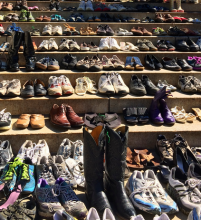
The empty shoes came in all shapes and sizes — cowboy boots and sneakers, children’s sparkly shoes and women’s dress shoes. They filled step after step going up toward the entrance of the Wisconsin State Capitol.
The shoes — 467 pair of them — represented the death toll from guns in just one state: Wisconsin.
"I want you to look at these empty shoes," Jeri Bonavia, told the crowd gathered on the Capitol steps on Monday. "I want you to bear witness. All across our state, families are aching with emptiness."
Bonavia is the executive director of the Wisconsin Anti-Violence Effort, which is using this display of empty shoes in five cities around the state this week.
In the nationwide scheme of things, Wisconsin has a lower death rate from guns than the nation as a whole. The annual average of 467 from murder, suicide and accidents is just a fraction of the approximately 30,000 gun deaths each year across the U.S.
And yet the row upon row of empty shoes on the steps spoke to the heartache that comes with each death, whatever the toll in whatever state.



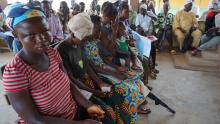
The headlines and talk shows are dominated by the response ISIS. To be clear, this group readily uses fanatical and brutal actions to achieve its radically exclusive vision. The images they skillfully project are like violent, X-rated video games made real. No wonder that many react to this horror with chills going down their spines. But there is something that worries me more: the ongoing Ebola crisis.
How did ISIS come about? Sure, there’s huge complexity. Yet, we know that ISIS never would have emerged without, first of all, the U.S. invasion of Iraq and the ensuing, devastating war that left that nation in physical, political, and psychological shambles. Second, the sectarian, Shia-dominated regime, which emerged as the final U.S. ground troops left, further radicalized Sunni extremists. These factors were the breeding grounds for black-clothed fanatics ready to cut down any who differ with their identity, even if the majority of its victims are Muslims.
ISIS’s greatest recruiting tool is continued and renewed U.S. and Western military intervention in the Middle East. That, of course, is what their brutal actions are attempting to provoke. The moral callousness of this strategy inspires the fear which they desire and welcome.
However, ISIS can and will be contained. The neighboring regimes in the region are all deeply threatened by ISIS. In the end, they will be compelled to combat and resist ISIS the more these fanatics move out of the desert and toward others’ homelands. It will be bloody, but eventually other nation states and threatened sectarian groups, representing for the most part more mainstream and globally dominant expressions of Islam, will contain and defeat ISIS. The necessity and means of outside military assistance from the West and elsewhere is highly debatable, and at the end of the day, I don’t believe this will be the decisive factor.



Three elderly Italian nuns murdered in Burundi were laid to rest Sept. 11 in a Xaverian cemetery in the Democratic Republic of Congo amid heightened calls for action about their death.
Sister Lucia Pulici, 75, Sister Olga Raschietti, 82, and Sister Bernadetta Boggian, 79, of the Xaverian Missionary Sisters of Mary were gruesomely murdered Sunday in their convent in the Kamenge area of Burundi’s capital, Bujumbura.
The triple murders shocked Christians across the globe and ignited calls for the protection of sisters worldwide. The nuns were reportedly beaten and killed with a knife. At least one nun was decapitated. There were conflicting reports about whether they had been raped.

That was a bumper sticker Sojourners published at the outset of the Iraq war more than a decade ago. American church leaders had not only opposed the war but offered an alternative: "An Alternative to War for Defeating Saddam Hussein, A Religious Initiative." We not only presented it to Colin Powell’s personal council and Tony Blair, but also printed full-page ads in every major British newspaper the day before their Parliamentary debate and vote on the war. The U.K.’s Secretary of State for International Affairs, Clair Short, told me the only real alternative on the table in their Cabinet meetings was “The American church leaders’ plan,” which, she said, was seriously discussed. U.S. and U.K. leaders showed they were drawn to an alternative plan to war that would remove any weapons of mass destruction that Saddam Hussein might have had (which he did not) and even to ultimately remove him from power but without going to war. Pope John Paul II was also opposed to the potential war. Both the Vatican and the American church leaders warned that the potential costs of a war in Iraq could include increasing the scope and threats of international terrorism. ISIS is that sad prophecy come true; the habit of war prevailed.
I have always believed that any alternative to war must still address the very real problems at hand — just in a more effective way. To say that “war is not the answer” is not only a moral statement but also is a serious critique of what doesn’t work; wars often fail to solve the problems and ultimately make them worse. War has to answer to metrics, just as more peaceful alternatives do. The war in Iraq was a complete failure with enormous human and financial costs; ISIS is now one of the consequences.
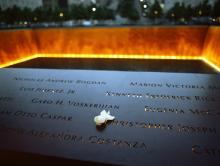
It’s been 14 years since our government declared war on terrorism. How are we doing? It feels like a disastrous game of Whack-A-Terrorist, doesn’t it? We kill one terrorist hiding in one hole, and out pops another one from another hole. Now we are facing the newest threat, a terrorist organization seeking to set up a nation-state, ISIS or IS, as its leadership prefers to be called. The Islamic State, at least, would be a concrete opponent. If they hold on to territory and establish a functioning government, we could at least declare war on a tangible target. Though regrettable it would at least make sense within the logic of war in which states fight other states.
In a recent article for Patheos.com, David French uses Christian Scripture as a justification for “responding to ISIS with wrath and vengeance.” French is a lawyer, a captain in the U.S. Army Reserve and senior counsel at the American Center for Law and Justice. He claims that, according to the Apostle Paul’s letter to the Romans, while individuals are called upon to love their enemies, there is no such call placed on governments. In fact, God has instituted governmental authority in order to execute his wrath against evildoers. And apparently, or so Romans 13 puts it according to French, to know who the evildoers are one simply needs to look at who governments are punishing. French quotes the relevant passage, Romans 13:3-5:
For rulers hold no terror for those who do right, but for those who do wrong. Do you want to be free from fear of the one in authority? Then do what is right and you will be commended. For the one in authority is God’s servant for your good. But if you do wrong, be afraid, for rulers do not bear the sword for no reason. They are God’s servants, agents of wrath to bring punishment on the wrongdoer. [Emphasis added by French.]
French concludes that American Christians should have no difficulty determining the correct response to ISIS. Why? By the fact of determining that justice must be executed against ISIS, our government has determined that their violence is not only an offense against American citizens (he names the beheading victims, journalists James Foley and Steven Sotloff) but against God himself.
French’s analysis strains credulity. Doesn’t he realize that the Romans to whom Paul was writing were themselves victims of government persecution? Does he think that these persecuted Christians felt they were being justly punished? And what about Paul himself, a Roman citizen who was persecuted and executed by the Roman government? Doesn’t French realize that by his own argument, the Roman authorities were executing God’s judgment against Paul? And by his own analysis, French is a captain in a military force that is from its origins a justifiable target for God’s wrath. Why? Because the founding act of the United States was a rebellion against a government, and “whoever resists authority resists what God has appointed, and those who resist will incur judgment.” (Romans 13:2)
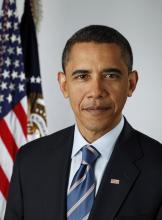
The following are President Barack Obama's remarks, as prepared for delivery, on the threat of the ISIL, delivered on Wednesday evening.
My fellow Americans – tonight, I want to speak to you about what the United States will do with our friends and allies to degrade and ultimately destroy the terrorist group known as ISIL.
As Commander-in-Chief, my highest priority is the security of the American people. Over the last several years, we have consistently taken the fight to terrorists who threaten our country. We took out Osama bin Laden and much of al Qaeda’s leadership in Afghanistan and Pakistan. We’ve targeted al Qaeda’s affiliate in Yemen, and recently eliminated the top commander of its affiliate in Somalia. We’ve done so while bringing more than 140,000 American troops home from Iraq, and drawing down our forces in Afghanistan, where our combat mission will end later this year. Thanks to our military and counterterrorism professionals, America is safer.
Still, we continue to face a terrorist threat. We cannot erase every trace of evil from the world, and small groups of killers have the capacity to do great harm. That was the case before 9/11, and that remains true today. That’s why we must remain vigilant as threats emerge. At this moment, the greatest threats come from the Middle East and North Africa, where radical groups exploit grievances for their own gain. And one of those groups is ISIL – which calls itself the “Islamic State.”

Eight years ago this Sept. 12, Pope Benedict XVI delivered a lecture at the University of Regensburg in Bavaria in which he seemed to diagnose Islam as a religion inherently flawed by fanaticism.
It was an undiplomatic assertion, to say the least — especially coming a day after the 9/11 anniversary — and it sparked an enormous outcry among Muslims and came to be seen as one of a series of missteps that would plague Benedict’s papacy until he resigned last year.
Now, with the Islamic State on the march in the Middle East, leaving a trail of horrifying brutality and bloodshed that has shocked the world, some of Benedict’s allies on the Catholic right are saying, in effect, “He told you so.”
“Regensburg was not so much the work of a professor or even a pope,” wrote the Rev. Raymond de Souza in a column for the National Catholic Register, a conservative publication. “It was the work of a prophet.”


I’ve had the chance to speak with author and international peace activist John Paul Lederach about his book, Reconcile: Conflict Transformation for Ordinary Christians. The book, updated from an earlier edition with a new introduction from Bill and Lynne Hybels and additional stories, is a powerful guide on how to seek and realize peace among us on both local and global scales.
Having traveled the world brokering peace agreements between governments and rebel groups, and having risked his own lives and that of his family for the sake of reconciliation, Lederach speaks prophetically to difficult issues facing us today in a way that few can.
From Gaza to Iraq and even Ferguson, Mo., we want to know: what do we do now? Thankfully John Paul Lederach offers us both the hope and the tools to begin achieving reconciliation, wherever we are. In our discussion below we talk about his book, which is capturing the attention and imaginations of leaders everywhere.


The Pentagon on Sept. 5 confirmed that the leader of al-Shabab, an al-Qaida-linked organization in Africa, was killed in a U.S. airstrike in Somalia this week.
The leader, Ahmed Abdi Godane, was targeted Sept. 1 in an airstrike that hit a vehicle and compound in a militant stronghold south of the capital, Mogadishu.
Al-Shabab has been linked to a number of attacks in Africa, including the bloody siege at the upscale Westgate Mall in Nairobi, Kenya, in September 2013 that killed 67 people.
“Removing Godane from the battlefield is a major symbolic and operational loss to al-Shabab,” Pentagon Press Secretary Rear Admiral John Kirby said in a statement.
At the time of the strike, the Pentagon said it could not confirm Godane’s death.
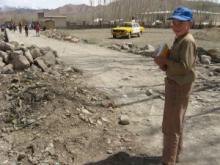
Here in Kabul, one of my finest friends is Zekerullah, who has gone back to school in the eighth grade although he is an 18-year old young man who has already had to learn far too many of life’s harsh lessons.
Years ago and miles from here, when he was a child in the province of Bamiyan, and before he ran away from school, Zekerullah led a double life, earning income for his family each night as a construction crew laborer, and then attempting to attend school in the daytime. In between these tasks, the need to provide his family with fuel would sometimes drive him on six-hour treks up the mountainside, leading a donkey on which to load bags of scrub brush and twigs for the trip back down. His greatest childhood fear was of that donkey taking one disastrous wrong step with its load on the difficult mountainside.
And then, after reaching home weary and sleep deprived and with no chance of doing homework, he would, at times, go to school without having done his homework, knowing that he would certainly be beaten. When he was in seventh grade, his teacher punished him by adding 10 more blows each day he came to school without his homework, so that eventually he was hit 60 times in one day. Dreading the next day when the number would rise to 70, he ran away from that school and never returned.
Now Zekerullah is enrolled in another school, this time in Kabul, where teachers still beat the students. But Zekerullah can now claim to have learned much more, in some cases, than his teachers.

It’s been said that our politics are often shaped by what we see out the window.
Twenty years ago, if you would've asked me if I thought police treat people fairly regardless of race, I would have confidently said, “Yes” — just like 70 percent of white folks in the recent Pew survey. In fact, 30 years ago, if you would've asked me what I wanted to be when I grew up I’d have said “a policeman.”
I grew up in a small town in Tennessee, which was still very segregated. Growing up, we knew the police officers by name. On more than one occasion, the police saved the day, and countless news stories celebrated the heroism and courage of police officers.
My mom and I used to go on walks together in a park, and I always looked forward to bumping into the officer who patrolled the park. She was tough as nails but always greeted me with an enthusiastic smile and a big bear hug. At the age of ten, she appointed me a “Junior Officer,” and she gave me a “real metal badge.” I felt like I was at the top of the world, and on my way to be officer of the year.
And then my window changed.

Pope Francis wrote to the president of Iraq, calling for an end to the “brutal suffering of Christians and other religious minorities” and urging political leaders to end the humanitarian crisis in the country.
Francis said in his letter to Iraqi President Fouad Massoum:
“I appeal to you with my heart full of pain while I follow the brutal suffering of Christians and other religious minorities who are forced to leave their homes, as their places of worship are destroyed.”
Cardinal Fernando Filoni, the pope’s official envoy to Iraq, delivered the pope’s message during his recent trip to that country. The two met at the Vatican on Thursday. The pope previously appealed to U.N. Secretary-General Ban Ki-moon to intervene to end the crisis.
Earlier this week, Francis revealed during a media conference with reporters that he was ready to travel to Iraq to try to find a solution to the ongoing violence.